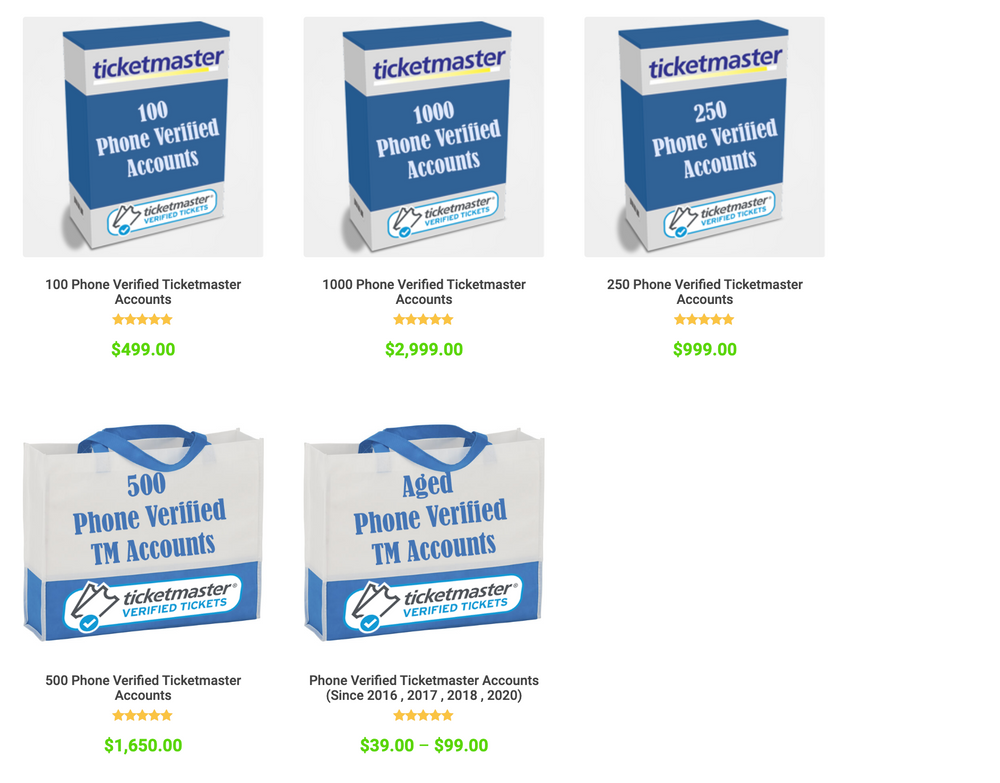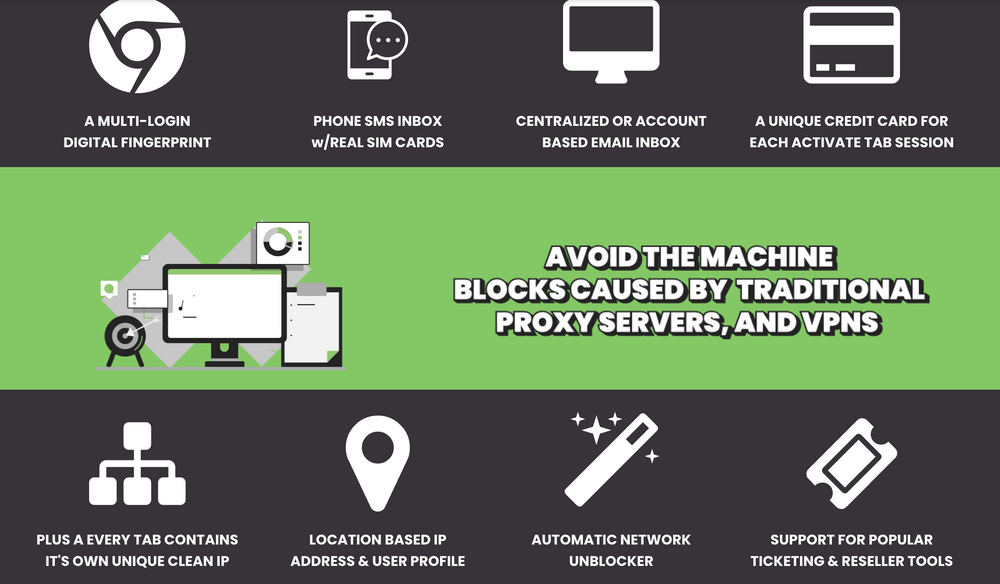
Image: Ticketmaster/Olivia Rodrigo
Jason Koebler
· Sep 21, 2023 at 2:04 PM
The “verified fan” concert ticket presale for pop sensation Olivia Rodrigo’s upcoming Guts Tour is today, and, yet again, it’s worth remembering that Ticketmaster stacks the deck heavily in favor of ticket scalpers, regardless of what the company says.
I’ve written about Ticketmaster and ticket scalping for more than a decade, and have covered various fiascos for fans, including the Taylor Swift Eras Tour, the recent Blink-182 tour, and the Cure tour. I have also reported on anti-scalping strategies implemented by Ticketmaster that, in practice, benefit scalpers. The main reason scalpers continue to get tickets and fans continue to be upset is because ticket scalpers are professional ticket buyers, who in many cases have navigated Ticketmaster’s buying process every day for years. The average music fan, meanwhile, might try to buy tickets a couple times a year at most, and doesn’t spend their days thinking of ways to optimize the ticket buying process.
Twitter is already full of fans who are confused about the onsale process for Olivia Rodrigo and are wondering why it took Ticketmaster so long to send out codes to buy them. It is also full of people who got waitlisted for tickets: “DEMAND IS HIGH,” Ticketmaster said in a tweet. “Fan response to Olivia Rodrigo’s GUTS world tour has been massive, and despite adding 20 more dates to better meet demand, there are still far more registered fans than tickets available.”
It is still unclear whether there’s even going to be a public sale for these tickets. With Taylor Swift, Ticketmaster canceled the public sale altogether. This system has the effect of making huge swaths of fans upset, but scalpers have figured out how to circumvent it. Here’s why scalpers are getting Olivia Rodrigo tickets, and you probably aren’t.
“Verified Fan”
Olivia Rodrigo is using a system very similar to the one used by Taylor Swift, which Ticketmaster calls “Verified Fan.” This is essentially a weighted lottery in which people have to pre-register for a chance to buy tickets. Ticketmaster then uses an algorithm that is nominally tied to previous buying history, the age of an account, and the account’s geographic location to determine whether that account can have a chance to buy tickets for specific shows.
The problem with this is that normal people have one Ticketmaster account tied to one email address and can therefore enter this lottery one time for one specific show. Serious ticket scalpers have many accounts (hundreds or thousands) tied to many different email addresses, with credit cards all over the country and can enter the lottery as many times as they want. As Joseph and I showed earlier this year, there is a black market for “aged” Ticketmaster accounts that are years old and might have a better chance of winning the Verified Fan lottery. Scalpers can buy “100 Phone Verified Ticketmaster Accounts” for $500 from a scalper-focused website, or they can buy “1,000 Phone Verified Ticketmaster Accounts.”

“All Accounts have been created with unique USA residential proxies. Unique password for each account. Will be creating accounts on your own catchall emails/gmails/hotmails/yahoos. We have not added billing info as you have to add your own credit + billing info,” one advertisement states.
One scalper I spoke to on the condition of anonymity to talk about industry practices told me that scalpers use these accounts to win Verified Fan lotteries.
But that scalper said they simply create their own Ticketmaster accounts. Ticketmaster now requires text message phone number verification, but they can bypass this by buying “Mobile Virtual Network Operator” phone numbers in bulk from eBay, which are cheap phone numbers that can be bought for SMS verification from very small cell phone companies and people who resell numbers from those companies . There are also services online and on eBay that sell “SMS verification” for the purposes of creating new accounts. “We provide a SMS verification code forwarding service to enable you to verify your online accounts such as social media / email / delivery / dating sites etc,” one eBay listing reads. This scalper then ages the accounts by letting them sit for a while, or by buying tickets on the accounts over time.
The sale of Ticketmaster accounts also lets scalpers sell tickets even when there are restrictions on scalping. Rather than selling the “tickets,” scalpers are selling the Ticketmaster accounts, with the tickets inside of those accounts.
Credit Card Presales
Before the “Verified Fan” presale, there was a special presale on Wednesday for American Express credit card holders (for Swift, the credit card presale was for Capital One cardholders). Credit card companies pay Ticketmaster and Live Nation so that their cardmembers can have exclusive access to tickets. Capital One also had an ad campaign with Swift. These credit card presales benefit scalpers, because serious ticket brokers have every sort of credit card, while every fan does not.
Specialized Internet Browsers for Ticket Scalpers
Tickets to popular events generally use a “virtual waiting room,” which is a lottery system on Ticketmaster’s website designed to prevent its servers from overloading. People are asked to open the event page at a certain time (usually 10 am local time) to get “in line” to buy tickets. Scalpers have the advantage here, too. The average fan opens a Chrome tab, goes to the event page, and gets in line one time. Each tab in Chrome is counted as the same “session,” and Ticketmaster’s software will sync those tabs up, meaning that regardless of how many tabs you have open, you can only be in line one time per browser.
Savvy fans who have been burned before might get in line a few times, by opening the event in Chrome, Edge, Firefox, and Safari. They might even get in line on their phone, too. Big ticket brokers, meanwhile, pay hundreds or thousands of dollars to use one of three different broker-specific web browsers that are designed to help get through virtual waiting rooms quickly.

These browsers, called Insomniac, Private Tabs, and KPX, are programmed so that each tab is a different session. This means brokers can enter the virtual waiting room hundreds or thousands of times. “Every tab contains its own unique clean IP,” Private Tabs advertises. Insomniac offers a “Century View” where hundreds of tabs can be monitored at a time. Private Tabs costs $500 per month. Insomniac costs $400 per month. KPX, a new browser, costs $40 per month.
These browsers have additional features that automate the ticket buying process or make it easy to handle a variety of situations that anyone buying tickets will face. Private Tabs lets scalpers get SMS codes directly in the browser, lets them set “location-based IP addresses” per tab (Ticketmaster sometimes allows people who are geographically close into the waiting room first), and has various autofill options for scalpers. In a promotional video, the creator of Private Tabs says that “if you have like, eight monitors,” the browser will let scalpers monitor waiting rooms in all eight of them. “Most of our customers gross OVER 1 MILLION IN SALES their first year using our WEB BROWSER tools!,” Private Tabs advertises. “300k+ Waiting Rooms Passed,” KPX advertises.
Average fans do not pay for browsers like this.
Selling Tickets Before They Go On Sale
Yesterday, my mom forwarded me an email: “Olivia Rodrigo GUTS Tour: Tickets On Sale Now!,” the email, which came from a secondary market ticketing platform called Box Office Ticket Sales, said. My mom asked me: “How can they be selling these if they don’t go on sale until tomorrow?”
The answer is that scalpers regularly sell tickets they don’t have, or that aren’t even on sale yet. Ticket resale sites regularly let brokers “substitute” tickets that are better than the ones they originally sold, so scalpers will list tickets that they don’t have at astronomical prices, hope they sell them, then try to buy tickets that are similar to the ones they sold for less than the price they sold them for. So, this is gambling, but it can often work as arbitrage. There are broker services that will look for inefficiencies in the market; brokers often will list tickets for a high price, sell them, then use software to automatically buy the tickets from another service for less money, pulling a profit along the way.
Of the practices I mentioned here, this one is maybe the least problematic, but it’s normal for fans (or their parents) to Google something like “Olivia Rodrigo tickets,” and have most of the results be ads that link to secondary platforms rather than Ticketmaster. Lots of sales are made to people who don’t realize that they’re buying tickets for more than face value from a random secondary ticketing market rather than the primary seller. Box Office Ticket Sales has a popup on Olivia Rodrigo tickets that says “ALERT: Tickets for this event are in high demand. Get yours today before they’re gone!” Many of the tickets listed are for “Zone Seating.”
“The tickets you receive may be in the specific section listed here or in an equivalent or better location. This listing describes tickets that the seller does not own or may not know the exact location of the seats, but is offering to obtain for you,” the site says. To its credit, the site also says “As a resale marketplace, prices may be above face value” and also says “we are a resale marketplace, not the ticket seller.”
As I’ve tried to point out in my reporting over the years, scalpers and Ticketmaster are engaged in a neverending game of cat-and-mouse, but the more difficult Ticketmaster ostensibly makes it to buy tickets, the easier it is for dedicated professionals to buy them while fans are left disappointed.
- Karlston and Mutton
-

 2
2



Recommended Comments
There are no comments to display.
Join the conversation
You can post now and register later. If you have an account, sign in now to post with your account.
Note: Your post will require moderator approval before it will be visible.